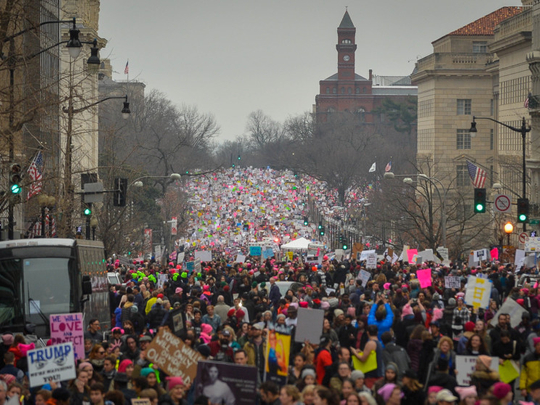
It’s hard to explain what it feels like to walk alongside a sea of joyful, but fed-up women. My friend Ann Friedman, taking a plane almost entirely filled with women on their way to Washington DC on Friday, described it as “like drugs.”
And it’s true. As I rounded a corner on Saturday morning at the Women’s March — which at last count had over 500,000 protesters in DC alone — I felt a rush of euphoria when I saw the crowd. Later, as I passed by a group of older women carrying ‘Why I March’ signs adorned with pictures of their daughters and granddaughters, it was difficult not to weep.
After watching a serial misogynist take the highest office in the nation, after the devastating loss in November, it’s overwhelming to remember that we are not alone. That there are more of us who care about equality — 3 million more to be exact — than there are those obsessed with walls and fear. And so it made sense that the women who arrived in DC on Saturday arrived with energy and joy. They flashed peace signs, smiled and shouted greetings at each other as they walked towards the main staging area. There were women with their babies, women with their grandmothers, women with signs, women in pink hats, and some in Wonder Woman costumes. (Even the actress who plays Super Girl got in on the action)
And although there are plenty of reasons to be angry, this was not a march of anger. None of them were. When you look at the pictures of the protests that took place in hundreds of cities across the world today, putting millions of women on the street, you see something amazing: you see joy.
There is singing, dancing, drums, costumes. All of us strangers, but somehow in that moment, not unfamiliar to each other either. Even better, the happiness of the day didn’t detract from the seriousness that women felt about the political moment. I spoke a young woman from Toledo, Ohio in a ‘Make America Nasty Again’ hat who spent the whole night on a bus with a friend to get here because she’s worried about women’s rights. The women I sat next to on my train from New York took a red-eye from California because they were horrified with Trump’s immigration stance and misogyny.
First moment of activism for some
And while political experts analysed from afar — David Axelrod, for example, tweeted out that the march’s energy would “mean little” unless “channelled into sustained political action” — actual protesters and speakers reminded us that they know more than pundits give them credit for. There were signs making links between feminism and environmentalism, one protester in Boston pointed out that, “Being scared since 2016 is a privilege,” and in DC activist and author Janet Mock shined a light on violence against trans people, saying: “My sisters and siblings are being beaten and brutalised, neglected and invisibilised, extinguished and exiled.”
While Saturday might have been the first moment of activism for some of the people who showed up in their city, or travelled across the country to be in DC, there were just as many who knew that activism didn’t begin or end today and that the movement is about more than just showing up.
For the moment, though, it felt beside the point to strategise on what comes next. Today was important — necessary, even — to simply have a day for a mass catharsis, a showing of hope and a reminder that we are in the majority. And when you walk among crowds of joyful women — women not willing to go back, women ready to fight — it’s hard not to feel like we’re the winners after all.
— Guardian News & Media Ltd
Jessica Valenti is a columnist and staff writer for Guardian US. She is the author of multiple books on feminism, politics and culture, and founder of Feministing.com.












